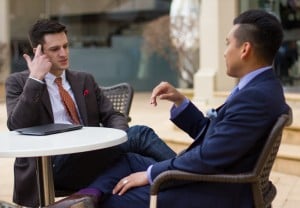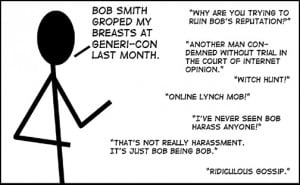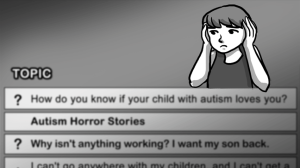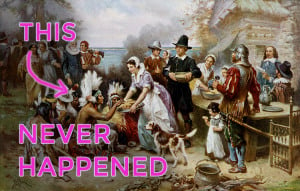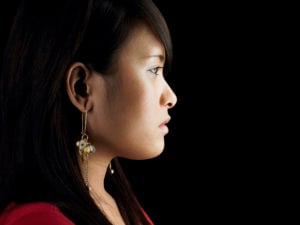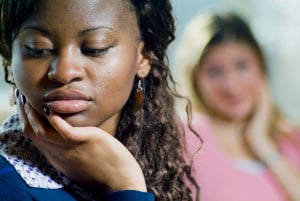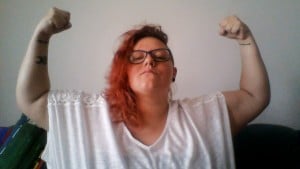
A close-up of a muscular arm flexing. Source: The Miss Information
Originally published on AlterNet and cross-posted here with their permission.
Macho culture – the perpetuation of hypermasculinity, dominance, violence, bravado – can be deadly, particularly for women.
According to the World Health Organization, women in the US are victims of intimate partner violence at a rate about five times that of men, and the United Nations has found that the most common form of violence experienced by women around the world is physical violence inflicted by an intimate partner.
While men experience much lower rates of violence, and are privileged in many respects, it’s both naïve and harmful to ignore the ways in which macho culture negatively affects their psyches.
Sexism is detrimental to society as a whole and should be examined as a cultural and systematic structure. Thoroughly understanding the effects it has on women as well as men can help reduce all manifestations of violence. Since gender is a performance, men are not inherently more violent, so this behavior can certainly be changed.
Here are four ways macho culture hurts men.
1. Causes Emotional Repression
Men are often discouraged from showing any sort of physical or emotional weakness. This can begin at a very young age.
“The earliest experience with macho culture was when I was young and started playing football,” says Jon Tribble, now an editor and professor of creative writing. “That was an extreme version.”
He believes that this sort of masculinity causes young men to suppress pain, and consequently, become incapable of understanding who they are and what they feel.
Celia Falcov, clinical professor in the Department of Psychiatry at the University of California-San Diego and author of Latino Families in Therapy, says that the fear of being perceived as vulnerable or weak can also keep men or boys from asking for help.
Not allowing boys to show emotion can have devastating effects that can last a lifetime. Warren Reed, an African American security guard living in Los Angeles, says that when he was a child growing up in rural Louisiana, his mother and sister discouraged him from playing with girls.
He feels that his family expected him to be tough and hypermasculine, even though that was not who he truly was. Because he felt misunderstood by his community, he became very withdrawn. “It affects me to this day,” he says.
Repression can also be incredibly detrimental one’s health. Falcov says that repression and denial can cause many health issues such as heart disease, high blood pressure, and back pain. According to the article “Hispanic Masculinity: Myth or Psychological Schema Meriting Clinical Consideration,” a growing body of evidence also reveals that chronic repression of anger is associated with cancer, asthma, higher levels of cholesterol, irritable bowel syndrome, ulcers, and insomnia.
2. Encourages Aggression and Violence
“Tendency towards domination and violence also has negative consequences for the machista man,” says Falicov. She believes that perpetually being in defensive mode can make these men unable to relax.
Not only that, many times macho men are compelled to fight to defend their hurt pride, which can lead to physical injuries.
Tribble says he witnessed this sort of propensity for violence when he managed movie theaters and had to deal with many teenage boys. He says that if these young men felt that a customer had disrespected them, they immediately wanted to fight back. “At a certain point, you’re no longer in a school yard,” Tribble says.
He believes that part of the problem is that young men don’t ever see the consequences of violent behavior in TV or film. “It’s not surprising because they’re being taught that being aggressive is going to get you good results.”
Reed feels that aggression and tough exterior is especially encouraged in black culture through hip-hop and film. “Image is everything,” he says. “If a guy doesn’t fit this certain mold, they [sic] get picked on. Kids emulate that to fit in.” He gives the example of the continued glorification of Chris Brown despite his violence against Rihanna. Reed feels that black men are always portrayed as “bad boys” or men with “swag,” and because he never felt like he fulfilled these images, he was called an “Oreo” and a “sellout.”
In a column about media representations of black men, Professor Darron T. Smith highlights the pervasiveness of these tropes. “These stereotypical, one-dimensional characters in film negate the broader and deeper experience of black life and the lives of black men in particular. Reaching into people’s homes through the media, these negative images influence personal opinions, ideas and racial attitudes.”
3. Perpetuates One Dimensional Representations
The media doesn’t do a good job of offering diverse and nuanced representations of women, but men are also often portrayed as one-dimensional.
Latino men, for instance are nearly always pigeon-holed in Hollywood. In a recent interview with CNN, actor Esai Morales pointed out these stereotypical roles: “Latinos are either cast as either the overly hormonal (‘Oh mamacita, I have to have you’), overly hysterical (‘Lucy!’), overly hostile (‘I’ll cut you sucka!’), or overly humble (‘We are a poor people’).”
Victor Hugo Paredes, a business executive, grew up in a macho household. He believes that those with power in the media should be challenging these norms. “Influencers have the responsibility to change the context,” Paredes says. He points out that actress and producer Eva Longoria is part of the problem by creating shows like “Devious Maids” instead of offering a more elevated representation of Latino men and women.
Tribble also points out that commercial media presents men as being single-minded in what they want. “Beer commercials should probably come with a disclaimer that says ‘don’t try this at home.’”
As a publisher, editor, and educator, Tribble says he tries to present a deeper and richer understanding of a what it means to be a man. “What I fear is that they will accept that a fairly limited version of themselves in the world is enough.”
4. Damages Relationships
When men grow up in sexist and macho environments, the way they perceive women and sex can be incredibly harmful. Falicov believes that emphasis on sexual prowess can lead men to participate in promiscuous and unsafe sex, which can sometimes be lethal. She gives the example of men who cheat on their partners and refuse to wear a condom because they feel they’re unmanly. They can infect their wives with HIV or other STDs, which hurts the entire family.
“I grew up in a household in which machismo was glorified,” says Paredes. “I can’t erase that part of my upbringing.” While he says he has tried to change his way of thinking, certain attitudes still endure. Women discussing their sexuality, for instance, still makes him uncomfortable at times. If men don’t see women as fully autonomous and equal sexual beings, this can negatively impact their sexual and romantic relationship.
Not only can macho culture affect connections with sexual and romantic partners, it can also damage friendships. If men are not encouraged to talk about their feelings, they are unable to forge deep emotional bonds.
Falicov points out that many times macho men must use alcohol and drugs to prove masculinity and communicate with other men, which can cause affect physical and mental health and impact friends, family, and work relationships.
[do_widget id=”text-101″]
Erika L. Sánchez is a poet and freelance writer living in Chicago.
Search our 3000+ articles!
Read our articles about:
Our online racial justice training
Used by hundreds of universities, non-profits, and businesses.
Click to learn more
Most Read Articles
- « Previous
- 1
- …
- 30
- 31
- 32







